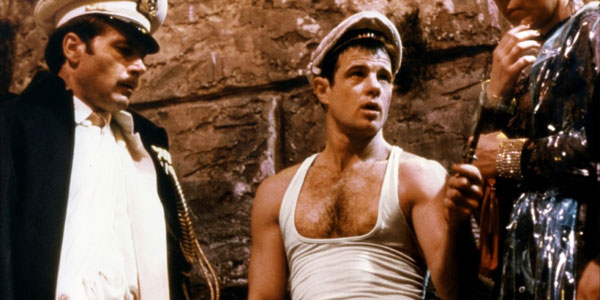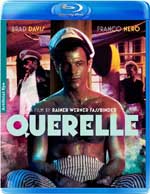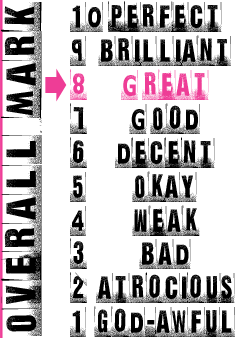
Director: Rainer Werner Fassbinder
Running Time: 104 mins
Certificate: 18
Release Date: March 10th 2014

Ever since it was first screened in 1982, Querelle has divided audiences. Some are drawn in by its complex exploration of sexuality, its theatrical look and tone, and the way it creates a totally fake world that feels oddly real. Others however can never get past its pretentious edges and the fact it is so deliberately artificial.
The 1982 movie was the final film of the storied Rainer Werner Fassbinder and it’s one of his most personal. While based on the dense and difficult Jean Genet novel, Querelle De Brest, it’s filtered through Fassbinder’s own life experience and the fact he’d come to realise that he was gay himself (he had a rather complex sexuality). It’s an impressive mix, keeping the philosophical literary pretensions of Genet, while turning a book most thought was unfilmable into something that feels almost like a trip into one man’s mind.
The film follows the titular Querelle (Brad Davis), a sailor who arrives in Brest in the hope of completing the sale of some opium. Once there he reconnects with his brother, murders a man and gets involved in an ever more complex situation involving doppelgangers, the police and a naval lieutenant (Franco Nero) who’s fallen in love with him. Then there’s the bar Querelle goes to, where his brother is the lover of lady owner, Lysianne (Jeanne Moreau). It’s a place where you can play dice to sleep with Lysianne, but if you lose you have to sleep with her husband, Nono. Querelle decides to lose on purpose.
It’s certainly a strange movie that’s difficult to explain to someone who hasn’t seen it. The entire thing was filmed on an indoor set, and it has a deliberately unreal and theatrical look that’s like very few other movies. The dialogue is sometimes natural, sometimes hard-boiled and sometimes somewhat surreal. Every so often a title screen comes up offering some sort of deep thought from the likes of Genet or Sartre. Fights are almost like dance, the police dress in outfits straight out of a 70s gay leather bar, and it’s an almost exclusively male world of pent up (homo-)sexual tension.
It’s strange, intriguing and rather dream-like, constantly hinting at ideas and possibilities while resolutely refusing to resolve exactly what it’s thinking and trying to say. It’s also rather unsettling, as there’s the constant feeling violence could erupt at any moment, partly because in this world violence and the erotic go hand in hand. There’s also the suggestion that Querelle has previously had an incestuous relationship with his brother and this is where his homoerotic urgings stem from.
It’s both real and unreal, and it often feels like everything we’re seeing are different aspects of a single personality. As a result the repeated refrain ‘Each man kills the thing he loves’ starts to seem rather self-destructive and a little more disturbing than the cliché it could easily have been.
Querelle is certainly not an easy film and a lot of people will think it’s just bizarre nonsense. But for those who don’t mind doing a bit of work and are open to something highly idiosyncratic and not quite like any other movie, there’s a lot to appreciate.
It also looks pretty good on Blu-ray. It’s visually so unusual – almost as if it’s set in a masculine gay fantasy land – and the HD picture brings out both its artifice and its art. It’s not perfect and there is sometimes quite a lot of grain, but it’s a worthwhile visual upgrade.
Overall Verdict: A strange movie that lives in an odd dreamland. It’s endlessly intriguing, thought-provoking, unsettling and erotic, while also being rather frustrating and pretentious – but you wouldn’t expect much else from a film that feels like taking a trip into a very particular gay man’s mind.
Reviewer: Tim Isaac





Leave a Reply (if comment does not appear immediately, it may have been held for moderation)